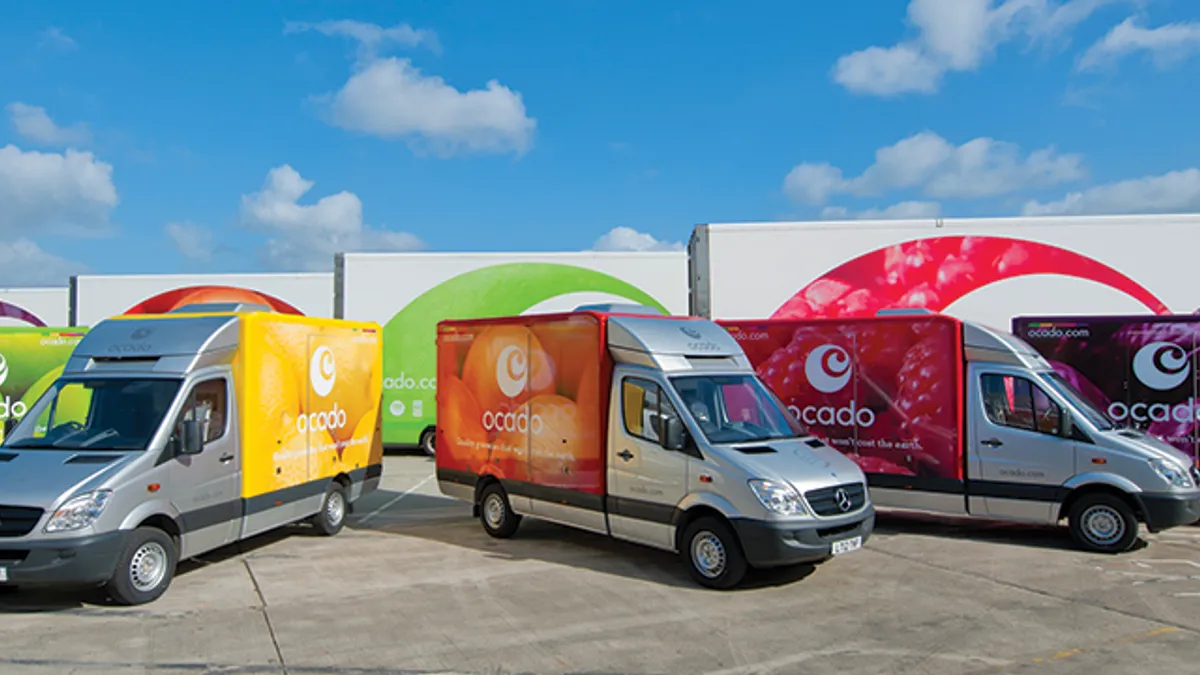Dive Brief:
- In addition to home delivery, Ocado’s automated warehouses will help Kroger fulfill its store pickup orders as demand rises, Kroger CEO Rodney McMullen said during a conference call last week. Kroger signed an agreement with Ocado last month that gives it exclusive access to the e-grocer’s automated fulfillment system in the U.S. The deal is estimated to be worth $250 million.
- “What we're really trying to do is to make sure that we have an overall infrastructure for digital that can support, whether it's 5% of share or 30% of share,” McMullen said on an earnings call. “If it ends up being 30% of share in grocery as digital then the Ocado, you'll have more sheds and they'll be used to take pressure off of the store, and the store will become more of a distribution point.” He said the company wants to move as quickly as possible to build Ocado facilities, noting the grocer is currently evaluating its first three sites.
- Kroger’s online sales rose 66% during the quarter, fueled by its Clicklist store pickup program and home delivery in select markets.
Dive Insight:
According to the brokerage firm Bernstein, Kroger will spend an estimated $400 million to help build Ocado’s automated warehouses in the U.S. To get the most of out of this pricey deal, the grocer needs to use those facilities for click-and-collect as well as home delivery.
The retailer’s ClickList pickup service may very well need the assist. Available at more than a thousand stores, with plans to gradually expand chainwide, ClickList has been the crucial first mover in markets across the country, and as a result has become very popular with shoppers. So popular, in fact, that Kroger executives see a not-so-distant future where demand may put a strain on stores.
It’s a scenario analysts have envisioned, wherein popular products are difficult to keep in stock, while picking and packing operations outgrow stores’ backrooms or begin crowding the aisles. According to McMullen, relying solely on stores as fulfillment centers could start diminishing the shopping experience in as little as a few years.
“We want to be proactive and be in position to deal with it versus reactive to dealing with it,” McMullen said.
Ocado’s warehouses, he noted, would “take the pressure off” by filling orders off-site, then delivering them to stores. Envisioning how this will work, though, raises a few questions. Ocado’s model in the U.K. is built around home delivery, not store fulfillment. Assuming the e-grocer will pick and pack orders, can it get those orders to stores without adding much in the way of extra costs? And how quickly can those Ocado facilities get orders to stores?
Since stores may be located dozens, even hundreds of miles away from the nearest Ocado facility, accommodating same-day order pickup or delivery may not be possible. Ocado’s sheds are built to fulfill large, planned grocery orders — not the spur-of-the-moment fill-up trip that many grocers, including Kroger, accommodate through services like Shipt and Instacart.
This could be a liability for the Kroger-Ocado partnership, since speed matters to U.S. consumers. According to a recent survey by eMarketer, shoppers want same-day delivery in grocery more than any other retail category.
These are all scenarios the two companies have undoubtedly considered. And it could be why Kroger says the Instacart service, which is currently available in 45 markets, will be “complementary” to Ocado. Instacart can handle same-day deliveries while Ocado handles planned deliveries and store pickups. For same-day store pickup orders, Kroger could rely on its available in-store stocks.
The more pressing issues with the Ocado tie-up may revolve around competition and market density. Ocado’s pricey, sophisticated technology requires it to deliver a high number of orders across its delivery areas — something that could be difficult to achieve in the U.S., where many regions are not very population-dense. And though Kroger has stepped ahead of Walmart and Amazon on fulfillment technology, don’t expect those two to let the grocer’s move go unanswered.
For these reasons, some observers aren’t convinced the deal is a win.
“The bottom line here is that grocery fulfillment is a necessity for driving sales, but even with Ocado's technology we still believe it is damaging to profits,” Neil Saunders, managing director of GlobalData Retail, wrote in an email sent to Food Dive.
At the very least, credit Kroger for being a forward-thinking grocer. As demand for online grocery accelerates, major players simply can’t rely on their stores alone to fulfill orders. Retailers will have to turn to automation in some form, or drastically change their stores.









